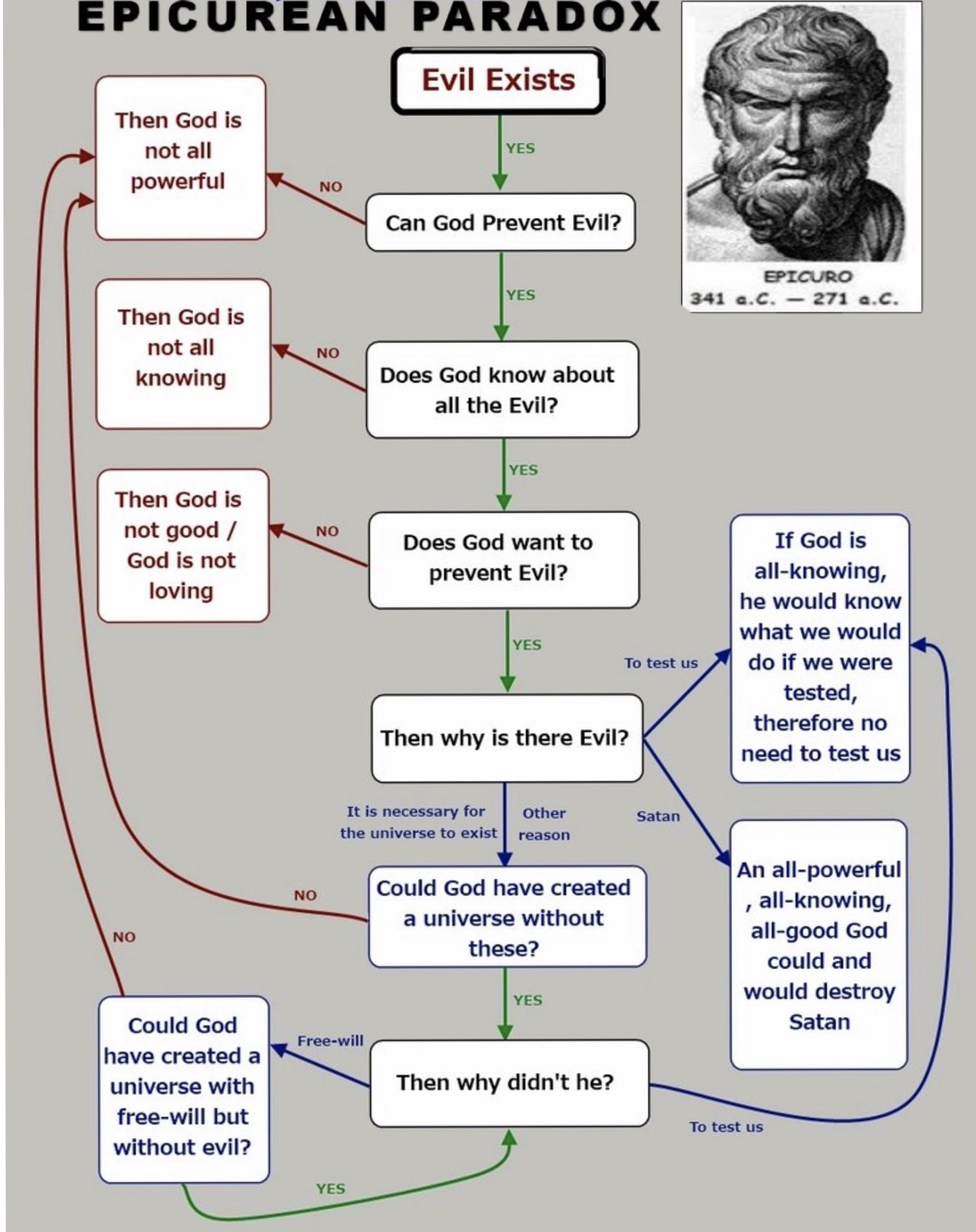Opposing the so called "Problem of Evil"
Introduction
Some people take to attack the goodness of God by claiming that a good God would not allow evil in any form or of any kind. But do you really think that this is the case? Let's look at one of the most commonly used arguments against God, which has only two premises and a conclusion.
| P1 | If an omnipotent, omnibenevolent and omniscient god exists, then evil does not. |
| P2 | There is evil in the world. |
| C | Therefore, an omnipotent, omnibenevolent and omniscient god does not exist. |
Supposedly this originates from a line of questioning of another greek philosopher known as Epicurus (what is up with these greeks and God?)
Would God be willing to prevent evil but unable? Therefore he is not omnipotent. Would he be capable, but without desire? So he is malevolent. Would he be both capable and willing? So why is there evil?
— Epicurus
Then divers redditors made diagrams to simplify the thought of Epicurus into a mechanical flowchart, which can be sent with zero effort to any theist (or an atheist or agnostic if they are so kind as to share their knowledge).

This is typically referred to as the Logical Problem of Evil, because it uses hard logic inference rules which no one disagrees with (provided you accept the premises). In contrast, there are also other forms of the general Problem of Evil argument, but most others are inductive in nature (meaning that they are closer to determining likelyhoods rather than hard facts).
The problem of The Problem of Evil
But as for you, ye thought evil against me; but God meant it unto good, to bring to pass, as it is this day, to save much people alive.
— Genesis 50:20 —
The problem now, however, is that if it can be shown that evil has & can be used for good, then the foundations of the objection disintegrates, because it is supposed that evil and good are very disjoint so that one cannot be used for the other and vice versa. Even consider your own experience, how that through much afflictions in life you learned many things which you take for granted to the point where the punishment that was so immediate and painful is now past recalling. The only exception to those afflictions is something severe such as PTSD with which you are worse off not experiencing the things you did. Even consider what the Spirit says to the saints.
And we know that all things work together for good to them that love God, to them who are the called according to his purpose.
— Romans 8:28 —
Short solution
The answer to Epicurus on why there is evil is in short that God may be glorified by making his attributes seen and known by the common person.
What if God, willing to shew his wrath, and to make his power known, endured with much longsuffering the vessels of wrath fitted to destruction: and that he might make known the riches of his glory on the vessels of mercy, which he had afore prepared unto glory,
— Romans 9:21-23 —
It is the very key element that people overlook when thinking about these things: they look at the start and the end but often omit their own experiences and being part of a larger story.
| Q | Evil exists? |
| A | Yes. |
| Q | Can God prevent evil? |
| A | Yes. |
| Q | Does God know about all the evil? |
| A | Yes. |
| Q | Does God want to prevent evil? |
| A | Yes. |
| Q | Then why is there evil? |
| A | (other reason) |
| Q | Could God have created a universe without these? |
| A | Yes. |
| Q | Then why didn't he? |
| A | Free will. |
| Q | Could God have created a universe with free will but without evil? |
| A | Yes. |
| Q | Then why didn't he? |
| A | Free will. |
| Q | Could God have created a universe with free will but without evil? |